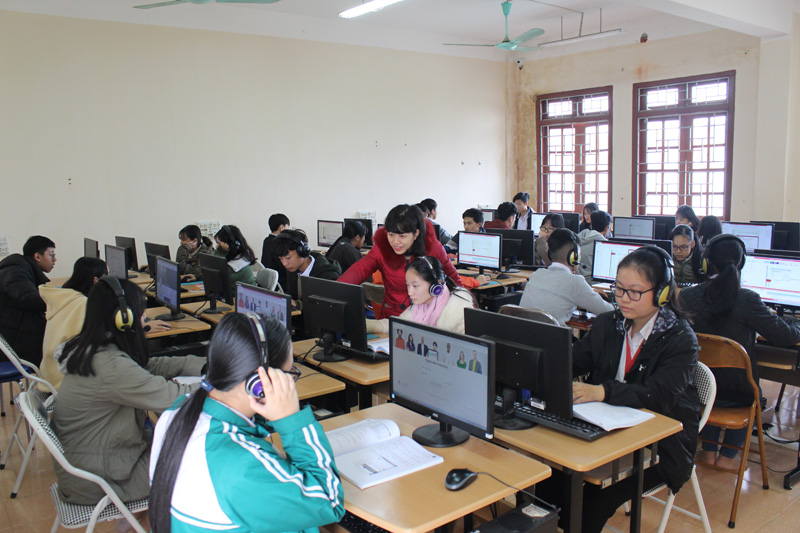
(HBO) – Improving the quality of foreign language teaching and learning is of utmost importance for the education and training sector, especially when the country is in the process of wider and deeper integration into the global economy, and moving along the trend of the fourth industrial revolution.
Photo:
Hoang Van Thu high school for gifted students equips four rooms with
internet-connected computers for the online teaching and learning of English
using the English Discoveries programme.
As a leading
high school in Hoa Binh, Hoang Van Thu is the first and only school in the
province to engage in international cooperation and teaching English using the
English Discoveries programme. Attractive lessons and abundant materials help
local students improve their four skills of listening, speaking, reading and
writing.
From the success of Hoang Van Thu High School, the provincial Department of
Education and Training directed all schools to diversify curricula and teaching
methods to meet education targets and demand for foreign language learning of
local students.
The department has put in place training course on English teaching methods for
primary teachers. Meanwhile, those who achieved B2 level are arranged to give
four lectures per week.
With the emphasis on improving local students’ listening and speaking ability,
the department has invited native English-speaking teachers and volunteers to
teach at schools and organising English speaking contests and talent
competitions for English teachers and students.
The local education sector aims to have some 15 percent of kindergartens in the
province promote IT application and access English teaching by 2020, and at
least 30 percent of kindergartens access English teaching by 2025. In the
system of general schools, the sector is striving to have some 73 percent of
primary schools, 50 percent of junior high schools, and 61 percent of senior high
schools engage in the 10-year English education programme by 2020; and 100
percent of students grading 3-6 join in the 10-year English education programme
by 2025./.
The Department of Education and Training of Hoa Binh province held a conference on March 18 to review the performance of the "Safe and Happy School" Project and set out tasks for 2025. The project, funded by the Taiwan Fund for Children and Families (TFCF), aims to create a safe, inclusive, and supportive learning environment for students. The event saw the attendance of representatives from the TFCF and 26 beneficiary schools.
With over 70% of their workers being women, trade unions across industrial parks (IPs) in Hoa Binh have been actively safeguarding their legal rights and interests while implementing initiatives to improve their income and well-being.
In recent years, the Hoa Binh provincial General Hospital has continuously innovated itself and improved the quality of medical services to meet the increasing needs of local people. With substantial investments in infrastructure and modern equipment, along with a team of highly qualified doctors and nurses, the hospital has gradually established itself as one of the leading medical units in the Northwestern region and a trusted destination for healthcare for people inside and outside the province.
From mastering the fundamentals of programming to achieving national recognition, the Programming Club of the Le Van Tam Primary School (STAR LVT28) in Hoa Binh city has made remarkable strides in the field of robotics.
The Ho Chi Minh Communist Youth Union Committee and the Vietnam Youth Federation chapter of Hoa Binh province organised a programme on March 12 to launch the "Digital Literacy" movement and an online quiz on the resolutions of the Vietnam Youth Federation congresses at all levels, as well as the Politburo's Resolution No. 57-NQ/TW on breakthroughs in the development of science, technology, innovation, and national digital transformation.
As climate change grows more unpredictable, the development of production forests has become essential - not just for economic growth, but for safeguarding the environment and maintaining ecosystem balance. By boosting local incomes, curbing natural disasters, preventing soil erosion, and protecting water resources, these forests play a crucial role in sustainable development.



